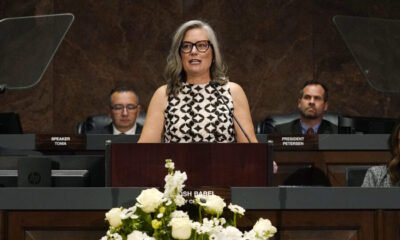Gail Griffin
Hobbs Strikes Down Bill Targeting Local Groundwater Control

By Jonathan Eberle |
Governor Katie Hobbs has officially vetoed Senate Bill 1300, a proposed measure aimed at empowering residents of southeastern Arizona’s San Simon Valley. The legislation sought to give local voters the chance to decide on establishing an Irrigation Non-expansion Area (INA) designed to temporarily halt the expansion of agricultural groundwater use.
Supporters, including Representative Gail Griffin (R-LD19), asserted the bill would have enabled voters in Graham and Cochise counties to take charge of groundwater management amid ongoing depletion. The Senate Bill had passed through Arizona’s Republican-controlled legislature earlier in the session.
If enacted, SB 1300 would have allowed county supervisors to propose the INA designation for the November 2026 ballot. Upon scheduling that vote, a temporary moratorium on new irrigation projects would have taken effect, effectively preventing any last-minute expansions before the election. If approved by voters, the moratorium would have become a permanent measure.
Griffin expressed disappointment in the veto, labeling it “a missed opportunity.” She emphasized that even a temporary pause would have benefitted the aquifer. “Whether voted up or down, either outcome would have resulted in at least a six-month pause on new agricultural expansion,” she stated.
Opponents of the veto, primarily Republican lawmakers, have criticized the Arizona Management Area (AMA) designation. They argue it enforces regulations suited for urban centers like Phoenix and Tucson while failing to address the economic realities faced by rural areas.
Griffin contended that these proposals overlook local community needs: “What the Governor wants in rural Arizona is to adopt regulations that are more stringent than those in urban areas,” she claimed, adding that such expectations are unattainable for rural communities.
In contrast, the Governor’s office promotes her groundwater policies as essential for addressing decades of overuse and declining aquifers. Republican legislators, however, advocate for more community-driven and flexible solutions, emphasizing initiatives that encourage stormwater recharge and localized decision-making to stabilize groundwater resources.
No immediate replacement for SB 1300 has been proposed. Republican leaders remain committed to engaging stakeholders on rural water policy moving forward. “We stand by our rural communities and the principles of local control, property rights, and strong local economies,” Griffin affirmed.
As Arizona confronts worsening drought conditions, declining aquifers, and an intensified debate over balancing agriculture and conservation, water experts and advocacy groups are closely monitoring the political landscape.


![Members of the Arizona House of Representatives vote during a third reading of nearly three dozen bills at the Arizona State Capitol on March 4, 2025. [Monica D. Spencer]](https://arizonanews.org/wp-content/uploads/2025/06/SR-347-Secures-53M-in-Third-State-Budget-Draft-Awaiting-400x240.jpg)
![Members of the Arizona House of Representatives vote during a third reading of nearly three dozen bills at the Arizona State Capitol on March 4, 2025. [Monica D. Spencer]](https://arizonanews.org/wp-content/uploads/2025/06/SR-347-Secures-53M-in-Third-State-Budget-Draft-Awaiting-80x80.jpg)













